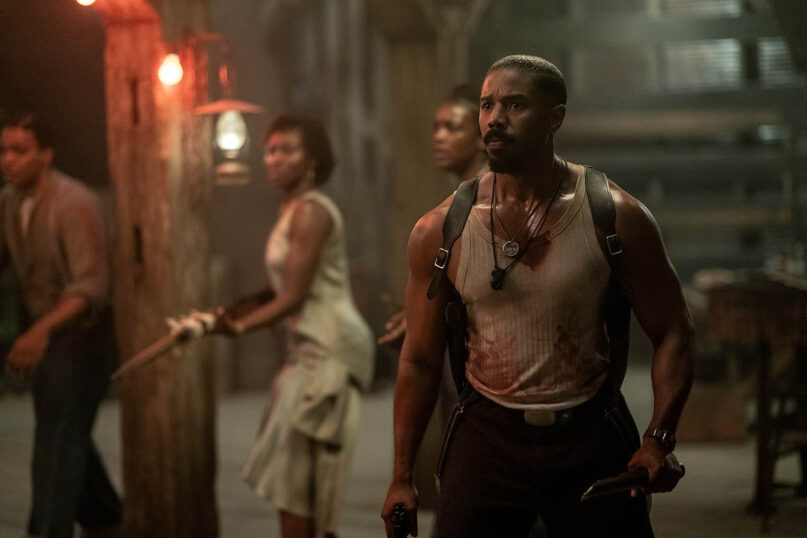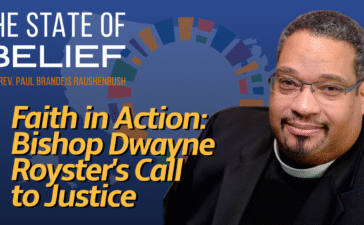(RNS) — There’s a scene in the hit movie “Sinners” where the congregation gasps as the doors of the little white church burst open. Sammie Moore, known as “Preacherboy” (played by Miles Caton), shuffles up the center aisle, bloodied, barefoot and gripping the shattered neck of his resonator guitar.
“Drop the guitar, Samuel,” his father, Jedidiah (Saul Williams), urges from the pulpit. He’d warned Sammie not to play at the opening of his uncles’ juke joint the night before. The blues, his father said, attracts demons.
Jedidiah’s command to Sammie to drop the blues for the Bible invokes a long-standing belief in Christianity’s spiritual preeminence in all things sacred. But little does he know that belief has already been ravaged by a vampire attack. Just hours earlier, Sammie tried to repel a horde of the undead by reciting the Lord’s Prayer, only for them to pray along with him. Their leader, an Irish vampire named Remmick (Jack O’Connell), explained he found the words comforting for their familiarity. “They were forced on my ancestors, too,” he says.
Some Black Christians have taken issue with “Sinners,” Ryan Coogler’s latest horror film, because of scenes like these. Grammy Award-winning Christian rapper Lecrae praised the film’s artistry but lamented what he called its “anti-Christian propaganda,” partly because hoodoo does in “Sinners” what Christianity typically does in horror films. Black Christian influencers like Johanna King and Isaiah Robin have echoed that sentiment — the former without seeing the film, and the latter condemning the involvement of real hoodoo practitioners.
However, anyone familiar with church history will recognize many of these critiques echo the teachings of colonizers. The real reason many Black Christians reject “Sinners” is because they’ve adopted the beliefs of their oppressors, not orthodoxy.
Many Christians are uncomfortable with the fact that they’ve inherited a supremacist religion. Centuries ago, popes gave European “explorers” permission to massacre and dispossess the Indigenous peoples of the Americas on the basis that they weren’t Christian. Protestant Christians are just as guilty, as they violently suppressed Indigenous spirituality among the Africans they enslaved in the so-called New World.

Actor Michael B. Jordan in “Sinners.” (Photo © Warner Bros. Pictures)
As much as Christians like Lecrae would like to sidestep it, that history is consequential. It means many Christians have been indoctrinated into supremacist thinking, believing Christianity is the only legitimate channel to the divine — that all others are dangerous or demonic and should be avoided.
“Sinners” defies the supremacist idea that the Christian church has a monopoly on access to divine presence, power and protection. And it says something beautiful about access to the divine.
In its most breathtaking scene, Sammie’s music melts the barrier between past, present and future as he conjures spirits of ancestors and descendants. African griots weave through the crowd, as do yet-to-be-born breakdancers and DJs. For the enraptured residents of Clarksdale, Mississippi, where the movie is based in 1932, the stress of living under the constant threat of Jim Crow terrorism melts into a joy tantamount to unity with the universe, where the only moment that exists is now. The sense of self as an individual dissolves, and one is enveloped in a feeling of love. If God is love and the source of all that is, as the Christian Bible states, then one can think of these moments as encounters with God.
Christians who grew up in traditions like mine, Assemblies of God, may have trouble with this idea, needing to believe God’s presence can only legitimately be accessed in certain places, through certain words and rituals, and definitely not at a juke joint run by two former gangsters. But if they can drop the need to see their faith as the only legitimate spirituality, they might recognize parallels between this most breathtaking scene and the gospel itself.
The scene has resonances with the wedding at Cana, where Jesus performs his first miracle. Christians would do well to remember it happens in the suffocating context of Roman occupation. The wine, a symbol of joy, runs out, but when the hosts ask for Jesus’ help, he begins to talk about time.
“It isn’t my time,” he tells the party guests. Some teachers believe this might have been an allusion to prophecies of ancient Hebrew prophets who foretold of a coming age where God would make all things right, including liberating them from the rule of Empire. In that time, said the prophets, the mountains would drip with wine (Joel 3:18; Amos 9:13).
So, when Jesus turns so much water into wine at the wedding at Cana, he brings a taste of that future age into the present. The barrier between the past (the prophets), the present (the wedding) and the future (the age of endless wine) melts.
The problem for many Christians, however, is the juke joint doesn’t become a thin place in the name of Jesus. No sermon was preached and a bunch of unholy things happened. But Jesus didn’t use his wedding miracle as a platform to preach salvation either. And I’m sure the wedding attendees weren’t perfect, especially by today’s pious Protestant standards. I can’t imagine being at a wedding with the Assemblies of God folk I grew up with and not only drinking so much alcohol we run out but asking Jesus to make us more.
The essence of Jesus’ first miracle is he — like Smoke and Stack in “Sinners” — facilitates a proleptic moment of eschatological joy for an oppressed people enduring systematic hardship in the present. There’s something holy about that.
And what “Sinners” depicts about spiritual power may be more offensive to some Christians. When the vampires besiege the juke joint, hoodoo rather than Christianity provides the wisdom and tools to ward them off. Annie (Wunmi Mosaku), a hoodoo practitioner, advises her comrades to find garlic, sharpen wood into stakes and gather silver. Other than a passing nod to holy water, Christian symbols and practices have virtually no place in their arsenal against the bloodsuckers. And the scenes where hoodoo works to ward off evil suggest there is trustworthy spiritual power outside of Christianity, and that it may not always be evil.
It’s sad some Black Christians today echo our enslavers and reduce the representation of hoodoo in “Sinners” to “witchcraft,” especially invoking it as shorthand for anti-Christian or evil. Indigenous spiritualities were powerful sources of resistance to colonial oppression.

Wunmi Mosaku portrays Annie, a hoodoo practitioner, in “Sinners.” (Photo © Warner Bros. Pictures)
For example, the Haitian Revolution, which yielded the first free Black republic in the New World, began with a Vodou ceremony. So, when the Christian colonizers banned other spiritual traditions, it wasn’t out of zeal for orthodoxy, but a desire to make their victims easier to rule. Through the church, the colonizers sought to monopolize access to the divine because they understood how dangerous it would be for the oppressed to have a spirituality that affirmed their dignity and freedom.
When Black Christians enforce the ban on African spirituality, they parrot wicked men who weaponized the Bible to commit some of the most heinous crimes against humanity in history. Men who used religion to execute so much terror can’t be trusted to advise anyone, much less the people they terrorized, on what constitutes true religion.
That brings me back to the movie’s opening and closing scene. When the Lord’s Prayer fails to protect Sammie from the vampire horde, “Sinners” offers its strongest critique of the Christian faith as passed down by colonizers: that it is useless against the evils we fight because it’s often part of those evils.
That’s not “anti-Christian propaganda.” It’s an observable fact. Sometimes, the name of Jesus doesn’t save but is used to justify the noose, the gas chamber or the weaponized drone. If that makes some Christians uncomfortable, maybe it should — not because “Sinners” dishonors the faith, but because it exposes what’s been done in its name. If the church can’t face that, maybe it’s not the vampires we should be afraid of.






